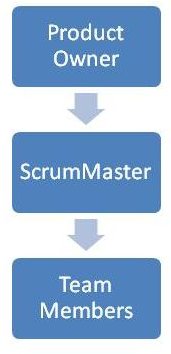ScrumMaster – A Role Definition
Roles in a SCRUM Team
A SCRUM team consists of the Product Owner, the ScrumMaster, and team members (developers, testers, user interface engineers etc.) The Product
Owner is responsible for representing the interest of the client and is in a position of authority over the team members. However, the ScrumMaster acts more as a facilitator for both the Product Owner and the team members. Their basic role is to remove any impediment to the team and Owner and to make sure everyone on the team can perform to the best of their ability. They may provide training, make sure the team has the tools they need, or even do something as basic as adjust their working conditions.
This is not a management position. Although the ScrumMaster has authority over the process of the project, they do not have authority over team members. They can make changes to the process, suggest team members take action, and empower members to do tasks correctly, however they have no authority to change someone’s role or to fire someone.
The ScrumMaster is responsible for empowering the team to control over how they will perform their work. The ScrumMaster clearly needs to know SCRUM, but they are also responsible for motivating and understanding the team’s psychology. The ScrumMaster’s role requires more than basic project management skills.
Key Success Factors
Know your SCRUM: As a ScrumMaster, part of your duty is to know SCRUM process and ensure it is being implemented properly. This will include imparting knowledge on SCRUM to the team. It also won’t harm to know basic Agile planning techniques. Empower the team to make decisions: The only way this can happen is by removing barriers and developing a high level of trust. Barriers exist between team members such as developers and test engineers. Barriers may also exist between the development team and the product owner. Removing barriers and resolving conflicts is a critical success factor.
Managing Your Team: The fact is, SCRUM requires commitment. The team needs to work within the SCRUM process and feel that they are a part of the key decisions being made. This requires tremendous collaboration and team empowerment. Until the team feels committed to the Sprint, the SCRUM team will fail to deliver. The ScrumMaster is constantly challenged to foster an environment that enables the team to deliver with the high productivity promised by following the SCRUM process. Sometimes this could even lead to changing organizational values and behaviours. To be successful, consider doing a ScrumMaster certification.
References
- The ScrumMaster Role: http://scrummethodology.com/the-scrummaster-role/
- Learning Scrum - the ScrumMaster: http://www.mountaingoatsoftware.com/scrum/scrummaster
